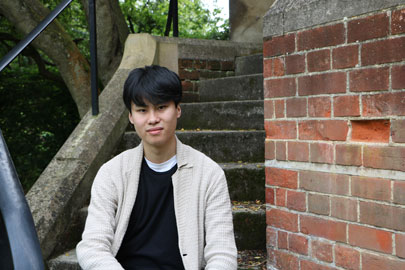
Tell us a bit about yourself.
Hey, my name’s Jinho and I’m from Brighton. I’ve just finished my second year student at Selwyn studying physical natural sciences (Phys. NatSci) and took chemistry and history and philosophy of science (HPS). Next year I hope to be studying Chemistry and at A-Level I took chemistry and double mathematics.
What has changed between first and second year at uni?
For physical natural scientists the shift from first to second year is one met with a slightly reduced timetable (as you go from four options in first year to three in the second), however, this does not necessarily result in less work - in
fact, I found myself being able to spend more time on revision and supervision problems with the extra space in my timetable, something I greatly welcomed. Another significant change is the increased degree of specialisation - although it may not apply to all physical natural scientists, the majority tend to pick more related options in their second year leading to more overlap and a feeling of being less stretched than compared to first year. The detail in which second year options are lectured in is also greater than their first year counterparts, I believe this is in preparation for the third year where students only take one option.
Beyond that, second year is quite enjoyable as people have already gotten to know each other after first year so coming back after the long summer vacation feels a lot less anxious than coming to Cambridge for the first time. Specifically to Selwyn, going into second year also means moving out of Cripps Court (the first year accommodation) and into either Old Court, Ann’s Court or one of the numerous houses dotted around the college. Most of these sites are close to the heart of the college making it easier than in first year to go to hall, visit the JCR (junior combination room) or the bar. Furthermore, having the option to choose the type of accommodation that best suits your own preferences is a nice change to first year - for example, the traditional and central rooms of Old Court or the larger and fully ensuite Ann’s Court rooms.
How do you manage your work with everything else going on?
The workload at university is quite high with three hours of lectures for each option per week in natural sciences, an hour long weekly supervision for each option, compulsory laboratory work that lasts anywhere from three to six hours every week as well as time to complete problem sheets and write lab reports. To manage the workload it is vital to have a structured timetable with periods of time dedicated to doing work but also times where you can unwind. A good way of managing your time is to try and treat university like a 9-5 job where you stay in your department and during the odd hour between lectures or labs go to the library and try to do some supervision work or finish a lab report. With a well structured timetable there should be plenty of time in the evenings to meet with friends and have some well deserved leisure time.
Anything else you’d like to add?
I think Selwyn is a brilliant college to study at. As many will have mentioned, we’re located close to central Cambridge but also far enough out to avoid the crowds and traffic. With respect to natural science departments, we’re close to both the New Museums and Downing site (biological sciences) but also to the West Cambridge site (physics and material sciences). Furthermore, at Selwyn we have the pleasure of having very talented academics and supervisors that make learning the large quantities of content much easier. As for the facilities offered at Selwyn, we have a newly renovated bar, a traditional looking court, chapel and hall that gives you all of the benefits of being at an older college but with new modern facilities. You don’t have to take my word for it though, if you have the opportunity to attend an open day please come to Selwyn and see for yourself!